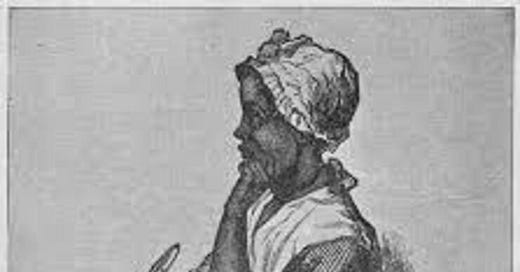'On Imagination'
Phillis Wheatley, 'On Imagination'
Imagination! who can sing thy force?
Or who describe the swiftness of thy course?
Soaring through air to find the bright abode,
Th’ empyreal palace of the thund’ring God,
We on thy pinions can surpass the wind,
And leave the rolling universe behind:
From star to star the mental optics rove,
Measure the skies, and range the realms above.
There in one view we grasp the mighty whole,
Or with new worlds amaze th’ unbounded soul.
What we love about this passage...
The originality, profusion, and precision of the imagery simultaneously explain and enact the poet's definition of imagination. 'Mental optics' is especially eye-catching, as is the idea that imagination isn't some vague soaring of unfettered fancy but a precise act of measurement, allowing us to see and to grasp 'the mighty whole'.
The fact that Wheatley was enslaved gives immense poignancy to this excerpt and to the poem as a whole. Wheatley is telling us how vital the imagination is, especially to those in slavery; denied the freedom to roam physically, they can at least imagine and dream themselves elsewhere. The reference to 'new worlds' in the final line evokes the common image of America as the 'new world,' though here it pointedly lacks the sense of freedom usually associated with it.
About the author
Phillis Wheatley (1753-84) died young, at the age of 31, but managed in her short life to be a pioneer. Enslaved from the age of seven or eight, she learned to read and write, began to compose poetry, and became the first African-American writer to publish a collection of poetry. She was freed by her masters shortly after her poems appeared.
To read alongside...
The recent biography The Age of Phillis by Honorée Fanonne Jeffers uses deep archival investigation to correct some of the patronising ways that Wheatley’s life story has historically been told.
Wheatley’s classical engagement in her images and style is echoed by Derek Walcott, who widely uses classical mythology and even deliberate misquotations of classical poetry in his work. The Odyssean journey at the heart of his poem ‘Sea Grapes’ ends with the line: “The classics can console. But not enough.”
(suggestions by Dr Alexandra Paddock)
Suggest a LitHit!
Tell us your own favourites from literature you've read, and we can feature you as a Guest Curator. Just email us with the following information:
Your full name
The title of the book you're suggesting
The location of the excerpt within the book (e.g., "in the middle of chapter 5"), or the excerpt itself copied into the email or attached to it (in Word)
Why you love it, in just a few sentences
**Please note that we welcome all suggestions but at the moment we can only release excerpts that are out of copyright and in the public domain. This means 75 years or more since the author's death. You can find many such out-of-copyright texts on the internet, for example at Project Gutenberg and Standard Ebooks.
About LitHits
You might also enjoy...
Writers Make Worlds: https://writersmakeworlds.com/
The Ten Minute Book Club: https://www.english.ox.ac.uk/ten-minute-book-club
Project Gutenberg: https://www.gutenberg.org/
Standard Ebooks: https://standardebooks.org/
“Five Tips to Get Reading Again if You’ve Struggled During the Pandemic,” The Conversation (8 January 2021): https://theconversation.com/five-tips-to-get-reading-again-if-youve-struggled-during-the-pandemic-152904
Feedback
We'd love to hear your thoughts on our newsletter:
kirsten@lit-hits.co.uk
Graphic design by Sara Azmy
All curation content © 2022 LitHits. All rights reserved.




